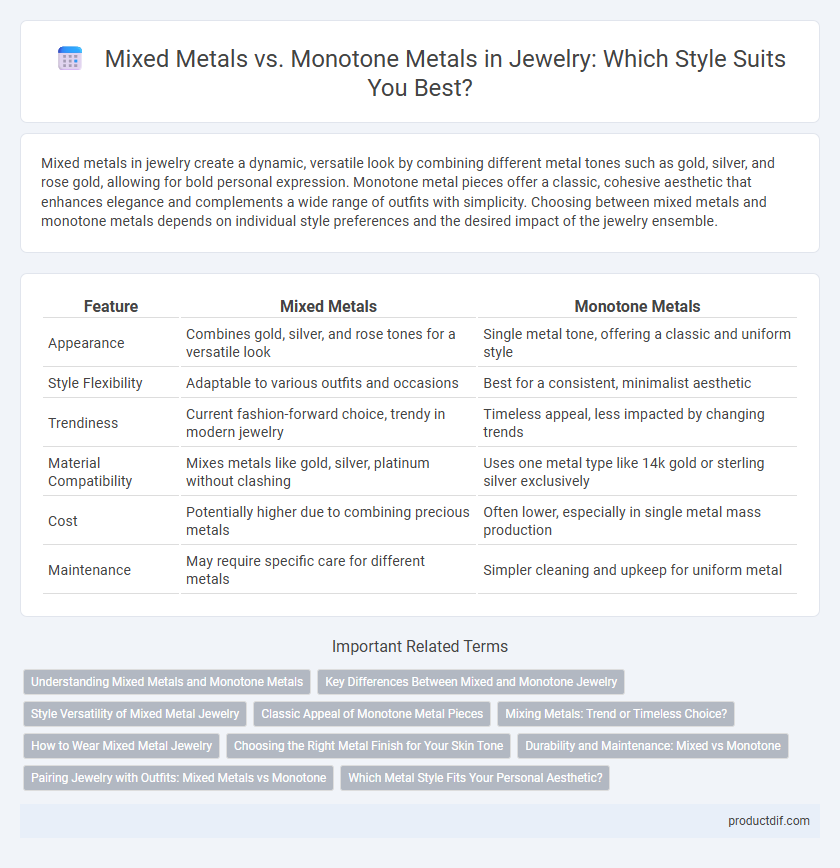Mixed metals in jewelry create a dynamic, versatile look by combining different metal tones such as gold, silver, and rose gold, allowing for bold personal expression. Monotone metal pieces offer a classic, cohesive aesthetic that enhances elegance and complements a wide range of outfits with simplicity. Choosing between mixed metals and monotone metals depends on individual style preferences and the desired impact of the jewelry ensemble.
Table of Comparison
| Feature | Mixed Metals | Monotone Metals |
|---|---|---|
| Appearance | Combines gold, silver, and rose tones for a versatile look | Single metal tone, offering a classic and uniform style |
| Style Flexibility | Adaptable to various outfits and occasions | Best for a consistent, minimalist aesthetic |
| Trendiness | Current fashion-forward choice, trendy in modern jewelry | Timeless appeal, less impacted by changing trends |
| Material Compatibility | Mixes metals like gold, silver, platinum without clashing | Uses one metal type like 14k gold or sterling silver exclusively |
| Cost | Potentially higher due to combining precious metals | Often lower, especially in single metal mass production |
| Maintenance | May require specific care for different metals | Simpler cleaning and upkeep for uniform metal |
Understanding Mixed Metals and Monotone Metals
Mixed metals in jewelry combine two or more metal types, such as gold, silver, and rose gold, offering versatile styling and contemporary appeal. Monotone metals concentrate on a single metal like sterling silver or yellow gold, providing a classic, cohesive look ideal for traditional or minimalist designs. Understanding the properties and color contrasts of these metals helps in selecting pieces that complement various outfits and personal styles.
Key Differences Between Mixed and Monotone Jewelry
Mixed metals jewelry combines different metal types, such as gold, silver, and rose gold, offering versatile styling options and a contemporary look. Monotone metals jewelry features a single metal type, creating a classic and cohesive appearance that emphasizes uniformity and simplicity. The key difference lies in visual complexity, with mixed metals providing contrast and layered textures, while monotone metals ensure timeless elegance and ease of matching.
Style Versatility of Mixed Metal Jewelry
Mixed metal jewelry offers unparalleled style versatility by combining gold, silver, and rose gold tones in a single piece, complementing a wide range of outfits and skin tones. Unlike monotone metals, which can limit coordination options, mixed metals provide a dynamic look that effortlessly transitions from casual to formal settings. This adaptability makes mixed metal jewelry a preferred choice for fashion-forward individuals seeking to maximize their accessory options.
Classic Appeal of Monotone Metal Pieces
Monotone metal jewelry showcases a timeless elegance with its uniform color palette, often crafted from gold, silver, or platinum that enhances versatility and sophistication. These classic pieces seamlessly complement any outfit, making them a staple in both everyday wear and formal occasions. The cohesive look of monotone metals highlights craftsmanship and detail, ensuring a polished and refined aesthetic.
Mixing Metals: Trend or Timeless Choice?
Mixing metals in jewelry, such as pairing gold with silver or rose gold, has evolved from a seasonal trend into a timeless style that offers versatility and personal expression. This approach allows for seamless layering and pairing with various outfits, enhancing the overall aesthetic appeal. Jewelers emphasize that mixed metal pieces can complement diverse skin tones and fashion preferences, making them a lasting favorite in contemporary jewelry collections.
How to Wear Mixed Metal Jewelry
Wearing mixed metal jewelry creates a dynamic and versatile look by combining gold, silver, rose gold, and platinum pieces for a balanced aesthetic. To style mixed metal jewelry effectively, layer delicate necklaces or stack bracelets and rings in different metals while keeping the design cohesive through similar textures or themes. Incorporate mixed metals with neutral or solid-colored outfits to allow the jewelry to stand out and create a sophisticated contrast.
Choosing the Right Metal Finish for Your Skin Tone
Selecting the appropriate metal finish enhances jewelry's impact by complementing individual skin tones; warm skin tones are best suited to gold, copper, and rose gold, enriching their natural glow. Cool skin tones harmonize with silver, platinum, and white gold, offering a sleek, elegant effect. Mixing metals like gold and silver in a single piece allows versatility and can balance complex skin undertones, creating a personalized style statement.
Durability and Maintenance: Mixed vs Monotone
Mixed metal jewelry combines materials like gold, silver, and platinum, offering unique aesthetic appeal but requiring careful maintenance to prevent tarnish and corrosion due to differing metal properties. Monotone metal pieces, typically crafted from a single metal such as stainless steel or titanium, tend to be more durable and resistant to scratches, making them easier to maintain over time. Choosing monotone metals often ensures longer-lasting shine and structural integrity with minimal upkeep compared to mixed metal combinations.
Pairing Jewelry with Outfits: Mixed Metals vs Monotone
Pairing jewelry with outfits involves strategic choices between mixed metals and monotone metals to enhance style impact. Mixed metals like gold and silver offer versatile combinations that complement diverse wardrobe colors, adding depth and a contemporary edge to any look. Monotone metals, such as a uniform gold or silver set, create cohesive elegance and are ideal for formal or minimalist styles, ensuring a polished and sophisticated appearance.
Which Metal Style Fits Your Personal Aesthetic?
Mixed metals offer a versatile and bold approach to jewelry, combining gold, silver, and rose gold to create an eclectic and modern aesthetic that suits those who enjoy dynamic, layered looks. Monotone metals like all gold or all silver provide a classic, cohesive elegance, perfect for individuals who prefer a minimalist or traditional style. Choosing between mixed metals and monotone metals depends on whether you want your jewelry to make a statement or maintain understated sophistication.
Mixed Metals vs Monotone Metals Infographic

 productdif.com
productdif.com